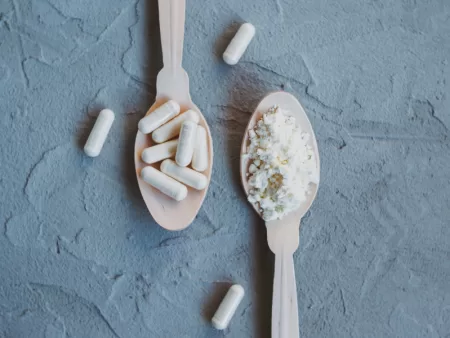The sophisticated work of the endocrine system and influence of the hormones on the body is a pretty interesting area. The fact is that these compounds control all the vital processes and determine our metabolism, fertility and mood. Thus, if one, for instance, experiences a lack of testosterone, the body signals at once with various unpleasant symptoms.
Let’s delve into more details and discover how this system works and how we can restore its balance if needed.
What are Hormones
These compounds have different chemical natures but their main task is to signal the body what to do and how to act according to the outer and inner conditions. This may sound a bit complicated. Moreover, we have over 50 hormones in the body!
But it’s important to understand that all that starts in the brain and hormones just carry the messages to organs and tissues. In this way, they control:
- metabolism or the conversion of food into energy and other substances;
- homeostasis (permanent balance inside the body);
- growth and development of the body;
- sexual activity and reproduction;
- sleep-wake cycle;
- mood.
Therefore, when the concentration of some hormones changes, we experience lots of symptoms. In order to treat them, a physician should find out which hormone causes the problems and does the body lacks it or has more than is required.
Causes of Hormonal Imbalance
Why the endocrine system can go mad? The reasons are numerous and can be combined. In general, we can divide them into internal and external.
Internal
As for the internal factors, we should mention the following:
- genetics determines the production of hormones and also is responsible for the development of some diseases of the endocrine system;
- the aging process changes the production of certain hormones, especially of the sex group;
- health conditions and various diseases may influence this process.
Thus, the link here is very close and direct. If the body does not produce enough hormones, it feels bad, and, vice versa, some illnesses lead to hormonal imbalance.
External
At the same time, the world around us has a constant influence on our inner processes, namely:
- Diet is the main source of vital nutrients and compounds that are utilized to create hormones inside the body. In addition, bad eating habits lead to certain diseases and some cases of hormonal imbalance.
- Lifestyle is also quite important, as a sedentary lifestyle is associated with many health issues, for instance, with obesity that can further lead to diabetes and a general imbalance of hormones in the body.
- Persistent stress exhausts the system of cortisol and adrenaline production and changes the metabolic processes. This has a wide range of bad consequences for health.
- Our environment may bring toxins to the body that ruin the endocrine system or do not provide enough macro- and microelements that are harmful too.
Estrogen
This is one of the main female hormones that determines fertility. The peak of estrogen production is observed in the middle of the cycle and is associated with ovulation, the best moment for getting pregnant. If this does not happen, its concentration starts to decrease gradually up to menses. Then, the cycle happens again.
Signs of high/low estrogen
Changes in the concentration of this compound are associated with the following signs:
- irregular period;
- swelling and tenderness of the breasts;
- mood swings;
- decreased sex drive;
- weight gain;
- loss of hair;
- fatigue and insomnia.
Usually, low levels of this hormone are associated with unpleasant symptoms. However, when the concentration is too high, this leads to anxiety and panic disorder and has a bad impact on overall health.
Progesterone
This compound is important for getting pregnant and maintaining pregnancy. Usually, its levels naturally rise just after the ovulation to help the reproductive system of a woman implant the fertilized egg. If this does not happen, the concentration decreases and then starts to rise again. During the pregnancy, it stays high to maintain this process and make it last the needed period.
Signs of high/low progesterone
Its high concentration is associated with breast swelling and tenderness, bloating and increased anxiety. When the level drops, a woman experiences:
- low libido;
- hot flashes;
- headaches;
- mood swings;
- absence of menses;
- sore breasts;
- low blood sugar.
Testosterone
The crucial compound for men is called testosterone. We should mention that women also need to have its low concentration, but in men, it determines the development of the reproductive system and fertility. In addition, this compound regulates:
- muscular mass;
- fat distribution in the body;
- production of red blood cells;
- cognitive functioning;
- sex drive.
Signs of high/low testosterone
Both high and low concentrations of this compound have a bad impact on overall health. When it rises, a man experiences:
- acne and other skin issues;
- aggressive behaviors;
- heart and liver diseases;
- headaches;
- excessive body hair;
- high blood pressure;
- higher libido;
- increased appetite.
While the presence of testosterone in the body decreases, the symptoms are as follows:
- low sex drive;
- erectile dysfunction;
- loss of hair;
- loss of muscle mass;
- constant fatigue;
- obesity;
- depression and anxiety.
These are the symptoms that often accompany the aging process of men and can be overcome by special medicines and supplements.
Thyroid
The thyroid gland produces two compounds that are known as triiodothyronine and thyroxine. These hormones contain iodine and are important for weight control, maintenance of energy levels and internal temperature, growth of hair and nails, skin condition, etc. Actually, they shape metabolism and tell the body how to produce and use energy.
Signs of high/low thyroid
When there are too many thyroid hormones, the patients suffer from:
- an irregular heart rate;
- trembling;
- excessive sweating;
- red palms of the hands;
- an itchy rash;
- loose nails;
- hair loss.
- a swelling in the neck due to an enlarged thyroid;
If, on the contrary, the concentration drops, the following symptoms appear:
- persistent fatigue;
- weight gain;
- low tolerance to cold;
- pain in joints and muscles;
- dry skin and hair;
- heavy or irregular menses;
- infertility;
- slowed heart rate;
- anxiety and depression.
Both conditions are treated with special medicines.
Cortisol
This compound is also known as a hormone of stress. It is responsible for fight-or-flight reactions. Thus, in normal life, its concentration rises in the case of danger. This happens to mobilize the body and make it more active. When the danger passes away, the concentration of this compound should drop. When it stays high, this leads to certain health problems.
Signs of high/low cortisol
High cortisol increases sugar levels in the blood, provides it to the brain and muscles, increases the ability of the body to repair tissues, enhances the work of the immune system, etc. When it persists, this leads to hypertension and abrupt weight loss. Patients with lower cortisol gain weight easier and have a slower heart rate.
Hormonal Health and Specific Life Stages
While we are discussing the endocrine system in detail, we should mention that it undergoes certain changes during our lives. The composition and concentration of hormones in the body may be divided into three main periods.
Puberty
Adolescence is associated with the activation of sex hormones. They push the reproductive system toward the development of secondary sexual signs and basically reshape the body. This is a crucial stage when a boy turns into a man and a girl becomes a woman.
When this stage is finished, it means that the body is ready for reproduction. Therefore, the concentration of sex hormones is established at some level and stays like that.
Menstruation and menopause
After puberty, the hormonal system of men and women becomes different. For men, the key role is played by testosterone, while women are influenced by estrogen and progesterone.
In addition, the body of a woman follows a natural cycle that lasts from 28 to 35 days. During this time, the concentrations of hormones gradually change. This is needed to make the body ready for pregnancy. If the latter does not happen, menstruation follows and the cycle repeats.
When the periods stop, a woman proceeds to menopause. During this time, her hormonal system is reshaped and pregnancy becomes impossible.
Aging
If the aging process for women is called menopause, men also experience it as their testosterone levels drop. This usually happens gradually and has an impact on overall health, sexual activity and mood.
This stage is natural but modern medicine and pharmacy provide certain medications and supplements to slow it down and avoid unpleasant symptoms.
Hormonal Imbalance and Fertility
One more issue to mention is fertility. As we have already seen sex hormones are related to this process. They are activated during puberty and prepare the body of men and women for reproduction.
The interesting fact is that both men and women have female and male hormones in their bodies. However, concentration matters and they should be balanced to make the body work normally. Thus, if something goes wrong in this area, this may lead to infertility and other related problems.
What is Hormone Replacement Therapy?
If the body does not produce enough hormones due to some disease or aging process, modern medicine is ready to solve the issue using replacement therapy:
- men who suffer from the aging process or hypogonadism get testosterone in different dosage forms;
- there are different medications for women that are utilized in case of lack of estrogen or progesterone or imbalance.
This therapy must be prescribed by a specialist after the blood tests and diagnostics.
Hormonal Health Supplements and Medications
How the situation is improved? Various supplements and medicines were developed for this. They differ in composition, mechanism of action and dosage, and should be selected individually according to the needs of the patient.
Supplements
The remedies of this group usually contain plant extracts, macro- and microelements and other compounds that aim at boosting the endocrine system. They may also provide the chemicals required for the creation of hormones in the body.
That is why their effect is not swift but it is not stressful for the body. It is often enough for the aging process when there are no diseases or dangerous health conditions.
Medications
As for medicines, they are testosterone-based for men and with estrogen and progesterone for women. There are oral dosage forms (pills), injections and topical remedies like gels, creams and patches. The concentration of hormones in them differs so they need to be prescribed individually.
Summary
Altogether, the endocrine system is a vital part of our everyday life but when hormones are balanced we do not feel this. As for their imbalance, it is accompanied by a variety of symptoms and is sometimes hard to diagnose. However, modern medicine is able to cure it and solve such tasks.
Therefore, if you feel bad, try to check the hormone levels. If they are improper, follow the recommendations of your physicians and restore hormonal health to live a full and happy life.
FAQ
For this, one needs to follow a healthy lifestyle and diet, achieve a life-work balance, sleep well and avoid stress. In addition, medicines and supplements can solve the imbalance issue
The most common include fatigue, mood swings, abrupt changes in body weight, skin problems, infertility, etc.
This means that all hormones are balanced and produced by the body in the proper concentrations.
If you suffer from its lack, then the medicines that contain it are helpful and useful.







